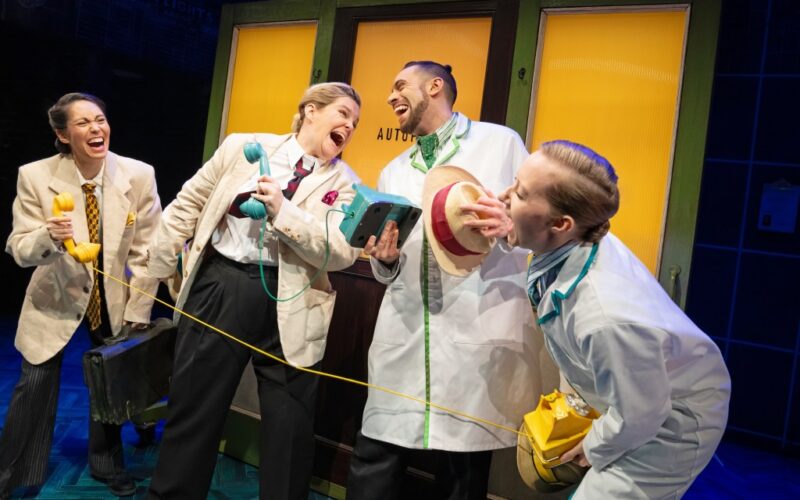Operation Mincemeat was not about baking tasty little seasonal pies, but rather the name given to an elaborate 1943 ruse concocted by the British intelligence services to clear out thousands of Nazi soldiers from Sicily by making them think the Allied forces were headed to Sardinia instead.
Incredibly, it involved a British submarine planting a dead body carrying fake invasion plans in the sea off the coast of Spain. Even more incredibly, it actually worked. The Nazis took the bait, hook, line and sinker, and skedaddled to Sardinia, smoothing the way for the Allies to take Sicily and marking a major turning point in World War II.
That story, arguably British intelligence’s finest hour, showed up in post-facto accounts, novels and movies as early as the 1950s, which happened to be when Ian Fleming’s James Bond first was shaking, maybe even stirring, U.S. interest in the likes of the top-secret MI5 and MI6. It also became a popular movie in 2021, starring Colin Firth as Montagu and Matthew Macfadyen as Charles Cholmondeley, two of the main Mincemeat makers.
Now this yarn is a self-aware and droll Broadway musical, a five-character London hit hoping that its very British signature blend of Monty Python and “Goon Show”-like humor, “Billy Elliot”-like music, “Hamilton”-like rhythms and hip, postmodern staging will tickle American fancy.
And why not? This ripping yarn is a lot of fun and very clever to boot.
Certainly, the caper-driven “Operation Mincemeat” is an unusual tuner for New York’s main stem, given its small cast and four-piece band. Three of the four writers of book, music and lyrics — David Cumming, Natasha Hodgson and Zoe Roberts — are also in the show.
It is very much a devised piece from a company called SpitLip, basically a fringe comedy company that says it specializes in “big, dumb musicals” but has amassed a formidable influencer following, which got “Operation Mincemeat” as far as Broadway.
Felix Hagan is also on the writing team, and Claire-Marie Hall and Jak Malone round out the cast working under Robert Hastie’s direction. Everybody plays numerous parts, assigned without regard to gender (there’s even a cameo for Fleming), but the anchors are Cumming’s Cholmondeley, the nerd who came up the audacious idea, and Hodgson’s Montagu, the operation’s main manager and salesman. There is more to that character than first meets the eye, though. Shh!
While it’s a retro wartime story, the overall sensibility here is both contemporary and self-aware, filled with sly critiques of the domination of wartime intelligence services by members of the British ruling class, exerting their sexist ways. For the most part, the show is composed of zany humor that bleeds into comic songs with witty internal rhymes (the songs of Tim Minchin are a helpful comparative).

On a couple of occasions, the emotions are musically stirred (one of this show’s biggest assets, and I wish there was more of that variety), but “Operation Mincemeat” is no feast of power ballads or choreographic variety. Silly ditties are far more prevalent, and I suspect there is a subset of the Broadway-going public who will be driven crazy by that, especially since we are talking a two-and-half-hour show here.
I’m not a detractor, though, even if I would swear I heard some of the same notes at one point as found in “Once We Were Kings” in “Billy Elliot” and thus can see an argument that it’s derivative. “Operation Mincemeat” nevertheless comes off as a very fresh and intelligent Broadway idea, and it’s performed at a high level, especially by Cumming and Hodgson. That sense of quoting other shows, including obvious nods to Mel Brooks’ “The Producers” and a sly reference to “King George” in “Hamilton,” is very-much baked into the self-aware aesthetic. Parody, after all, is always a great defense.
In the end, the story here is audacious enough to carry the show. At the finale, “Operation Mincemeat” blows its organic budget on some Broadway spectacle, confetti cannon and all, in a conscious but rather jarring way. I can see why SpitLip wanted to give New Yorkers their money’s worth, but the show’s biggest fault actually is its occasional inclination to go for the gag, or in this case the usual expectation, even if it blows its carefully wrought internal reality. I wish that energy had been put into deepening the emotional force of a score that could and should go a lot further.
Still. Minor quibbles. It’s crazy that this thing happened — but it did.








